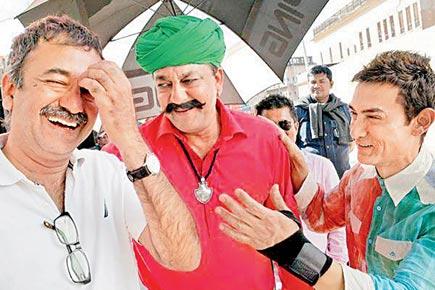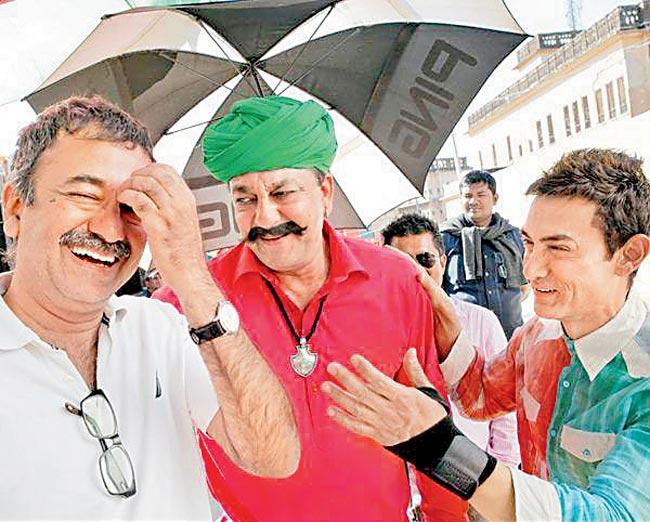Filmmaker Rajkumar Hirani on what makes a film click and why scriptwriting needs to be given importance in our country

Rajkumar Hirani is a picture of calmness against the air of excitement at a recent screenwriters’ lab held in the city. At the event conducted by Mumbai Mantra and Sundance Institute, the P.K. director is cautious enough to stick to script-related questions. In the ensuing tête-à-tête, the celebrated filmmaker explains which stories inspire him and what needs to change in Hindi cinema.
ADVERTISEMENT

Rajkumar Hirani. PIC/PRASHANT WAYDANDE
What do you think about the quality of scriptwriting in our country?
Anybody can tell you that scripts are the foundation of filmmaking; so if a script is good, better films can be made. In our country, we function in a slightly different manner, though. Different people make films for different reasons. Money is available — let’s make a film. An actor’s dates are available — let’s make a film. Very few say, ‘Here’s a great script, let’s make a film’. As a result, scriptwriting usually gets neglected. However, the situation is getting better if you compare today’s films to the ones we had, say 20 years ago. As of now, there’s variety in films. You have a Highway and a Queen clicking with the audiences. It’s undoubtedly a promising change.
How can a screenwriters’ lab contribute in such a scenario?
It contributes greatly. It’s a brilliant and a much-needed effort. We should have started such an exercise 15 years ago, but better later than never. Finally, we seem to be providing attention to those who actually make a film happen: the scriptwriters. Having said that, the whole effort is not going to move toward fruition immediately. Efforts take time to result in concrete change. Let’s say, eight-10 years later, we’ll have a new crop of gifted writers.
Scriptwriting being a subjective process, how can a mentor help talent grow?
Scriptwriting is indeed a subjective process. But instead of you writing alone in a room — trying to figure out your way into the industry — why not let experienced folks remove the roadblocks for you? When you interact with people, or say, a mentor, he’ll trigger your thought process in ways you might not have thought of before. Having someone to tell you, “What if you take this route or that route” helps a lot — with no hard and fast rule you take those routes. I’ve been through that phase myself so I know. During my younger days, I remember narrating my stories to others so that I could get a clue into characters or situations I somehow missed.

Rajkumar Hirani with Sanjay Dutt (centre) and Aamir Khan (right) on the sets of P.K.
Does your role as a mentor make you nervous?
I’m not really mentoring anyone in this lab. Anjum (Rajabali), who has written scripts such as Raajneeti and Pukar, is working closely with the young talents. I’m just adding my bit from the outside. I’ve been asked to read some scripts and comment on them — what I feel about them and things like that. It’s interesting to come across writers who have something new to offer.
And how would you deal with a bad script?
(Pauses) Bad scripts are easy to identify, just like a book. If it engages you, it’s a good enough book. The same is true about a good script. However, the trouble is not in identifying a bad script, it’s in pointing out a good script. And once you do that, what next? That’s the tricky part — to stick to a good idea and create a film out of it, that’s an altogether different story.
What are the advantages of being a director who writes his own scripts?
It’s not a matter of advantage or disadvantage. It’s more about a vision for a particular film. When you write your own films, you know the subject more deeply though you can’t possibly write all the nuances in a script. Most of it is left to imagination. So a scriptwriter-cum-filmmaker might be able to translate those nuances into cinematic realisations more effectively.
What drives you as a filmmaker... what compels you to make a movie?
If there’s an issue or a message that I believe needs to be delivered across through a film, then I take it upon myself to make it. Or else, what’s the point? Money has never really been a driving force for me.
How do you define success in commercial terms then?
I think success can’t be defined by ticket sales after the first weekend. To me, it can be defined by achieving what a filmmaker originally set out to make. There are films crossing R100 crore today but how many of them will you be talking about five years down the line? We don’t respect Mughal-e-Azam or Pyaasa or Sholay or Lagaan for the money they made. You don’t go and watch a Padosan or a Chalti Ka Naam Gaadi for the business it did. We remember them for the way they touched us. Films click at the box-office not always on its merit. A successful film is the one that you want to see even after five years.
Who have been cinematic influences over the years?
Different masters have influenced me. I was a huge Hrishikesh Mukherjee fan. Later on, I was touched by the films made by Gulzarsaab, Manmohan Desai and Ramesh Sippy. So it’s never been one person. From the West, I found Milos Forman’s body of work inspiring. Human interest stories have always moved me and they still do.
 Subscribe today by clicking the link and stay updated with the latest news!" Click here!
Subscribe today by clicking the link and stay updated with the latest news!" Click here!






